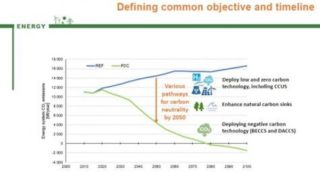-
UN report says CCUS is needed urgently to meet carbon-neutrality targets
Date posted:
-
-
-
Post Author
Greg Kelsall
-
-
![]()
A new Technology Brief published by the United Nations Economic Commission for Europe (UNECE) warns that time is running out to deliver on the Paris Agreement and the 2030 Agenda for Sustainable Development, calling for rapid deployment of carbon capture, utilisation and storage (CCUS) to meet carbon-neutrality targets.
Large-scale deployment of CCUS technology in the UNECE region would allow countries to decarbonise their energy sectors and ‘hard-to-abate’ industrial sectors in the medium term to bridge the gap until next generation low-, zero-, or negative-carbon energy technologies become available.
As noted in the UNECE Press Release accompanying the launch of the Technology Brief, the quantity of carbon dioxide (CO2) removal needed to achieve carbon neutrality far exceeds what current CCUS technologies could deliver, so CCUS investment must be seen as part of a broader portfolio of actions to avoid the unacceptable consequences of climate change. This includes deploying low- or zero-carbon technology and enhancing the capacity of natural carbon sinks such as forests, wetlands, permafrost and oceans.
![]()
The Brief provides an overview of 31 existing CCUS projects in Europe and 24 in North America, and looks at the various technologies available to:
- capture CO2 at source (from industries such as cement and steel, hydrogen production from fossil fuels, incineration of waste or power generation), from biomass energy, or directly from the air;
- store CO2 in deep saline aquifers or as part of enhanced oil recovery (EOR) operations; and/or
- utilise CO2 in mineralisation, chemical or biological processes.
Scandinavian countries, the United States of America and the United Kingdom lead the way in ‘CCUS readiness’, with these countries developing pilot projects and adopting needed regulatory frameworks. Smaller nations in the UNECE region seek international partners and financing to make CCUS a reality as they balance their climate objectives with their development imperatives.
According to UNECE Executive Secretary Olga Algayerova “Strong political will is needed to make affordable, clean, reliable, sustainable and modern energy for all a reality by 2030. As we prepare for the High-level Dialogue on Energy convened by the UN Secretary-General under the auspices of the UN General Assembly in September, UNECE is committed to supporting member states make 2021 the year of real action on energy”.
The Brief notes that large-scale deployment of CCUS will require a large amount of geological CO2 storage capacity. At present, known suitable sedimentary basins in the UNECE region have been identified in North America and Western Europe, namely the UK, the Netherlands and Norway. UNECE is preparing a study on the potential for storage in Eastern Europe, the Caucasus and Central Asia – in particular in the Russian Federation (Volga Urals, West Siberia, Caspian sub-region), Kazakhstan, Azerbaijan and the Caspian Sea.
The cost of CCUS is perceived as one of the main barriers for project development. Experts evaluate that for Europe alone, the cost of CCUS deployment planned to 2050 could amount to €320 billion and the required transport infrastructure could add a further €50 billion. The speed at which costs can be reduced will drive deployment at scale.
The Brief also highlights the need for acting at scale and urges nations to collaborate to improve the cost-effectiveness of large clean-energy infrastructure projects. Sharing best practices in both technology deployment and regulatory and policy infrastructure is needed to support long-term industry and government environmental commitments.


